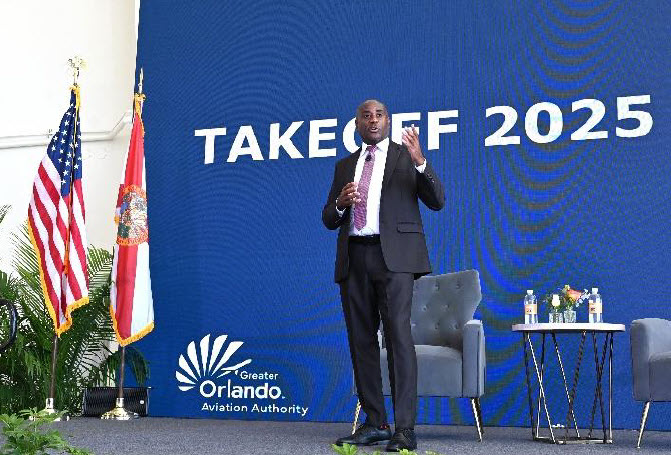Orlando International Airport (MCO) is moving forward with an ambitious $6 billion redevelopment strategy designed to overhaul its infrastructure and enhance the travel experience for the more than 57 million passengers who passed through the airport last year.
The Greater Orlando Aviation Authority (GOAA) outlined the major components of its long-term vision during its “Takeoff 2025” event, where leaders detailed upgrades expected to reshape airport operations over the next decade.
Major Improvements Planned Across MCO
GOAA officials announced a variety of technological and structural enhancements aimed at improving efficiency, expanding capacity, and elevating traveler convenience.
“Building the airport of the future is more than an aspiration. It’s part of who we are. It’s the essence of our work and the spirit that guides every decision we make,” Airport CEO Lance Lyttle said. “It means being smarter, more sustainable, and more connected. It means creating places where technology and hospitality work hand in hand to serve people better. It’s about moving from function to experience, from infrastructure to inspiration.”
The comprehensive modernization plan includes:
8,000 additional parking spaces to support growing traveler demand
Modernized baggage-handling systems for Terminals A and B
Facial recognition technology at key screening points
Autonomous wheelchairs to increase accessibility for passengers with mobility needs
Mobile food and retail ordering capabilities throughout the airport
New lounges and enhanced amenities designed to improve comfort
Electric air taxis, which could debut as early as 2035
According to GOAA, these upgrades will help meet increased passenger volume as Orlando continues to rank among the country’s top travel destinations. Lyttle emphasized that the improvements are not only intended to streamline airport operations but also to generate economic benefits for the region.
Growth in International Connectivity
In addition to infrastructure changes, MCO is preparing to expand its list of nonstop routes. A major milestone will arrive in February 2026, when ZIPAIR launches the first-ever nonstop flight from Florida to Tokyo. The flight, expected to take approximately 17 hours, marks a significant step in strengthening Central Florida’s international travel connections.
A Long-Term Vision for the Future of Travel
Some elements of the redevelopment plan may be completed within the next decade, with certain innovations—such as autonomous mobility devices and advanced security technology—already in development. GOAA officials say the Visioning Plan reflects Orlando International Airport’s commitment to embracing new technologies and preparing for the growing demands of global air travel.
As passenger numbers continue to climb, the sweeping modernization initiative aims to position MCO as a leading hub for innovation, accessibility, and international connectivity in the years ahead.







Comments